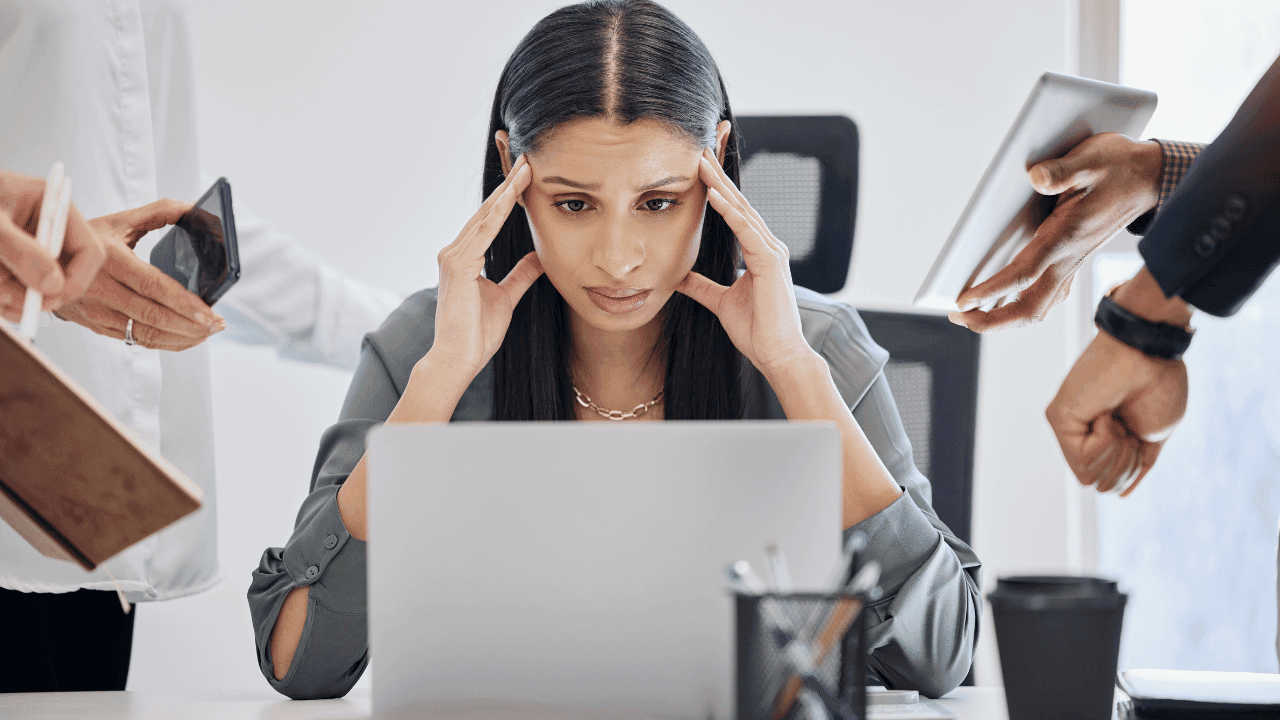How to Deal with Overwhelming Anxiety Your How-To Guide

how to deal with Overwhelming Anxiety? Starting to tackle overwhelming anxiety might seem tough, but it’s full of chances for big changes. This guide goes beyond just coping strategies. It dives deep into self-help ways to help you feel calm again. You’ll learn that even mild anxiety can be beaten with the right steps.
This guide gives you the tools to understand and manage anxiety. You’ll find many ways to help, from simple breathing exercises to getting professional help. Think of this as your guide to finding peace and balance in your mind.
Key Takeaways
- how to deal with Overwhelming Anxiety, Journaling helps spot what triggers your anxiety and keeps track of what works.
- The 333 and 5,4,3,2,1 methods help you stay present and focused.
- Deep breathing, like the 4-7-8 and 3-2-3 methods, can calm you down.
- Daily meditation and reality checks build your skills to handle anxiety.
- Aromatherapy and exercise offer ways to feel better and reduce stress.
- Facing your fears slowly helps you gain confidence and avoid them less.
- Getting help from professionals and Cognitive Behavioral Therapy can really help. Make sure to check if your insurance covers it.
Understanding Overwhelming Anxiety and Its Causes
Anxiety is a feeling of tension and worried thoughts. It can also cause physical changes like high blood pressure. Understanding the causes of anxiety is key to managing it. Factors like genetics, environment, and past traumas play a role. Learn more about the causes.
Common Triggers of Anxiety
Knowing understanding anxiety triggers helps manage fear and panic. Job stress, financial worries, and health concerns are common causes. Life events like moving or having a new family member can also trigger anxiety. With this knowledge, you can take steps to avoid anxiety.
The Psychological Effects of Anxiety
Anxiety has a deep psychological impact. It can lead to fear of future problems and constant worry. This mental strain can also cause physical symptoms, showing how mind and body are connected in anxiety.
How Anxiety Manifests Physically
Anxiety can cause symptoms like a racing heartbeat and sweating. These symptoms are uncomfortable and can make anxiety worse. Recognizing these signs is crucial in addressing anxiety, often needing medical help and lifestyle changes.
Anxiety is a natural response to threats but can become chronic. By learning about causes of anxiety, recognizing triggers, and understanding its effects, you can take control of your mental health.
How to Deal with Overwhelming Anxiety Recognizing the Symptoms of Anxiety
Managing anxiety starts with knowing its signs. It’s important to spot both physical and emotional symptoms early. This helps in getting the right help quickly.
Physical and emotional anxiety symptoms create a cycle of discomfort. Knowing these symptoms is the first step to finding ways to cope.
Emotional Symptoms to Watch For
- Persistent worry about certain things or situations, which might mean you have an anxiety disorder.
- Feeling uneasy, panicked, or thinking something bad is about to happen without a reason.
- Having trouble focusing, feeling overwhelmed, and unable to concentrate.
- Being able to hide your anxiety but feeling a lot of stress inside.
Physical Symptoms and Their Impacts
- Noticing your heart beats faster or you breathe quicker, which might worry you about heart problems.
- Feeling cold, sweaty, or tingling in your hands and feet, signs of your body reacting to fear.
- Feeling dizzy or weak, common during intense fear or panic attacks.
- Experiencing dry mouth or trouble sleeping, which can really affect your daily life and happiness.
Behavioral Changes That Indicate Anxiety
- Avoiding things that make you anxious, which can lead to feeling lonely or missing out.
- Having trouble staying calm, looking stressed or upset even when things are fine.
- Getting easily irritated or having mood swings that are out of proportion, upsetting those around you.
- Showing physical signs during panic attacks, like chest pain or feeling cold, which can happen quickly.
Seeing the signs of anxiety is more than just noticing symptoms. It’s about realizing how much anxiety affects someone’s life. This understanding can help both the person and their loved ones take steps to manage and beat anxiety.
How to Deal with Overwhelming Anxiety Practical Strategies to Manage Anxiety
Learning to manage anxiety can greatly improve your life. Two key methods are breathing exercises for anxiety and grounding techniques. Also, journaling for anxiety relief helps in the long run.
Breathing exercises for anxiety calm the body’s ‘fight or flight’ response. Techniques like 4-4-8 breathing and diaphragmatic breathing are helpful. They help the body feel safe, allowing you to control your emotions.
Grounding techniques shift your focus to the present moment. This can include touching different textures or noticing sounds around you. These activities can help you feel better when you’re anxious.
Journaling for anxiety relief helps you understand your feelings better. Writing about what makes you anxious can help you manage it better. Regular journaling can make you more emotionally resilient.
Mindfulness techniques like stretches and guided imagery are also helpful. They work on both your body and mind. Regular mindfulness meditation can make breathing and grounding exercises even more effective.
Using breathing, grounding, and journaling can help you in the moment and over time. These strategies are part of a complete plan to manage anxiety. They help you live a more balanced and fulfilling life.
How to Deal with Overwhelming Anxiety Lifestyle Changes to Reduce Anxiety
Looking to reduce anxiety naturally often means making big changes in our lives. By adopting certain habits, we can create a better environment for our minds and emotions.
Regular exercise is key, showing how exercise and anxiety are linked. Activities like yoga or swimming calm the mind and boost the body’s defenses against stress. Also, eating right is important for our mental health. A balanced diet helps keep our mood stable and makes us more resilient to anxiety.
Don’t forget the importance of sleep. It’s a basic need for good health and directly affects sleep and anxiety reduction. Poor sleep can make anxiety worse and upset our mental balance. So, it’s vital to get enough quality sleep to fight anxiety.
- Regular exercises like yoga, swimming, or brisk walking enhance serotonin and endorphin levels, which are pivotal for mood regulation and anxiety reduction.
- A well-rounded diet rich in vegetables, fruits, and lean proteins keeps the body’s systems in harmony and minds at peace, crucial for managing daily stresses.
- Structured sleep routines ensure that both body and mind have sufficient time to recover from daily stressors, preventing the compounding effect they can have when we are under-rested.
To learn more about managing stress and improving mental health, check out coping with anxiety and depression.
In summary, making these lifestyle changes—like exercising, eating well, and sleeping enough—gives you the power to handle and lessen anxiety. Remember, every small change can make a big difference in how you feel every day.
How to Deal with Overwhelming Anxiety Building a Support System
Creating a strong support system is key to managing anxiety. By using mental health resources for anxiety, getting professional help for anxiety, and finding community support for anxiety, people can feel more confident and supported on their mental health journey.
Building a support network involves identifying trusted individuals, being honest about feelings, joining groups, staying connected, seeking professional help, and supporting others.
- Seeking Professional Help: Getting help from professionals, like through Cognitive Behavioral Therapy (CBT), is crucial. People should reach out to services like Red Top Wellness Center for personalized support.
- Finding Community Support Groups: Joining support groups or online forums helps connect with others who understand. These spaces offer a chance to share and heal together.
- The Role of Friends and Family: Friends and family play a big part in managing anxiety. They offer emotional support, encourage seeking help, and create a patient and understanding environment.
Resources like NAMI and Mental Health America provide great advice on building support networks. They also help reduce anxiety stigma, making communities more supportive.
Building and keeping these relationships takes effort and openness. Showing gratitude, staying in touch, and celebrating each other’s wins are key to strengthening these bonds.
Note: All engagements should be approached with genuine care and an understanding of each person’s unique needs and limits to ensure healthy and supportive relationships.
How to Deal with Overwhelming Anxiety Mindfulness and Meditation Practices
In today’s world, finding mental clarity is a big challenge. But, mindfulness techniques for anxiety and meditation are here to help. They make our minds calm and keep us in the present moment. This brings us great peace.
Mindfulness techniques for anxiety include body scan meditation. You lie down and focus on each part of your body from toes to head. It helps you feel your body and relaxes your nerves. Walking meditation also helps, by making you aware of your surroundings and body, even while moving.
For beginners, guided meditation starts with these easy steps. Doing meditation regularly makes it a habit. Studies show that after six months, it can make you feel better, focus better, and be more emotionally strong.
The benefits of mindfulness and meditation are backed by science. They can lower job stress, improve focus, and help you sleep better. They also give you a safe space to deal with anxiety without judgment.
- They help you stay in the moment and be more focused.
- They teach you to accept your thoughts without judgment, helping break down mental health stigmas.
- They give you tools to handle stress better by increasing self-awareness.
Studies also show that meditation is good for mental health. A 1992 study in the American Journal of Psychiatry found that MBSR programs can reduce anxiety. A 2014 study in JAMA Internal Medicine also found that meditation can help with anxiety.
A University of Waterloo study found that just 10 minutes of meditation a day can improve focus and reduce negative thoughts. This shows how meditation can calm your mind and uplift your spirit.
Starting these practices can lead to better mental health and a more peaceful life. As we face life’s challenges, mindfulness and meditation can be powerful tools for lasting peace.
Staying Motivated and Resilient
How to Deal with Overwhelming Anxiety? Starting to overcome anxiety is like finding your way through a complex maze. You need strong motivation in overcoming anxiety and a solid base for long-term anxiety management. Begin by setting clear, reachable goals. These milestones help you see your progress and show the value of setting realistic targets.
Celebrating progress is key in your fight against anxiety. It keeps your spirits high and your mindset positive. Acknowledging each small victory is crucial. It helps you stay motivated and focused on overcoming challenges.
Regular self-care and mindfulness practices are also important. They help you stay calm and focused. By doing meditation and mindfulness exercises, you can improve your emotional balance and resilience.
To keep moving forward, plan carefully and stay strong in tough times. Self-care, like exercise and mindful eating, is vital. Having the support of loved ones is also crucial. Keeping track of your progress and being open to new strategies helps build a strong, resilient spirit.

















